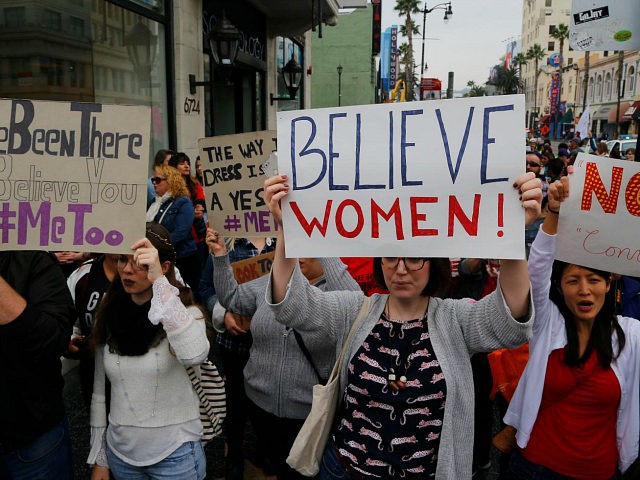In a potentially major backlash to the #MeToo movement, UK Home Secretary Suella Braverman said that she is considering granting legal anonymity to suspected criminals in order to prevent “trial by media”.
Making her first appearance at a Conservative party Conference as the head of the Home Office, Suella Braverman said that in the wake of several high-profile incidents of false accusations of sexual assault, she would look to reform reporting regulations surrounding those merely accused, but not proven of wrongdoing in order to prevent a “media circus” from damaging people’s reputations without justification. It is claimed that such incidents have occurred during the #MeToo movement.
“We have had some high-profile instances where the media circus around a suspect who has not been charged has been devastating. I think coverage of people prior to charge can be very, very damaging, particularly if the charges are not pursued or if they are dropped later on,” she told a Young Conservative audience at the Birmingham conference on Monday, according to The Guardian.
The recently installed Home Secretary went on to say that “trial by media will only undermine our justice system”.
Braverman was responding to a question over the sexual assault allegations levied against member of parliament Harvey Proctor and singer Sir Cliff Richard, both of whom were cleared of any criminal charges and who have claimed that the media circus surrounding their cases ruined their lives.
Sir Cliff, 81, was the subject of a police investigation as well as a raid on his home by the South Yorkshire force in 2014 after it was alleged that he had sexually assaulted a 15-year-old boy in 1985. In 2016, the Crown Prosecution Service (CPS) announced that it had “insufficient evidence to prosecute” Richard.
The pop singer was later awarded £400,000 from the police force in damages as well as another £210,000 from the BBC, which covered the raid with a helicopter over the singer’s home during the raid. A judge in 2018 found that his right to privacy superseded the BBC’s right to broadcast the incident.
“Will I ever get over it?” Sir Cliff asked rhetorically in 2019, “I can’t see how any individual, particularly because of the way the internet functions, there are people on there who still believe in that stupid saying of ‘no smoke without fire’.”
Sir Cliff Richard has backed a sex offence anonymity law change.
It comes after a false allegation against the pop star led to a police raid on his home being broadcast by the BBC.
For more on this story, head here: https://t.co/J4mTkigisK pic.twitter.com/l9x557CZAU
— Sky News (@SkyNews) July 1, 2019
Harvey Proctor, who served as a Member of Parliament for Billericay between 1983 and 1987, had his home raided by the Metropolitan Police in 2015 as a part of the Operation Midland, which sought to uncover historical sexual abuse against children by high-profile figures in Westminster. It was later revealed that the central source for the police probe, Carl Beech, who was in fact a confided child molester himself, was jailed for 18 years for fabricating the tales of paedophilia and murder among VIP politicians and society figures.
Proctor was later awarded £900,000 in damages and compensation for legal fees from the Metropolitan Police. The payout did little to satisfy the former MP, however, who claimed that he had lost his home and his job as a result of the damage done to his reputation.
“I am heartily sick of these police and their mealy-mouthed apologies to me and I did not want to take a fortune from public funds. Just enough to put my innocence beyond doubt, and to warn the police not to make this same mistake with other people,” Proctor said in 2019.
In some cases, damage from false allegations can be worse than just reputation. Thatcherite former Tory treasurer Lord McAlpine, who was also the subject of a fake accusation by Beech, was said to have had his death “hastened” by the stress of being accused as an old man in 2014.
While the repetitional damage done to those falsely accused of such crimes is undeniable, concerns will likely be raised over the potential chilling effect a change in the reporting rules will have on other victims coming forward against actual prolific sexual predators once their name has become public.
This will likely be of particular concern in light of the grooming gang scourge that has plagued Britain over the past few decades, in which the abuse suffered by thousands of young girls at the hands of mostly Pakistani rape gangs were overlooked by police because of politically correct officers fearing causing offence.
Commenting on the issue, grooming gang victim Samantha Smith said earlier this year: “I had no idea that I was not alone, but one of more than a thousand children in Telford who had been sexually exploited over decades while the police and youth workers, whose job it is to protect us, not only failed to act but all too often blamed us as the architects of our own trauma,” noting that inquires have found that the cases were “not investigated because of nervousness about appearing racist.”
“Meanwhile, the largely working-class white victims were treated as no-hope cases who were destined to fall into a life of crime, branded ‘troublemakers’ or even ‘child prostitutes’ by police,” and that “teachers and social workers were found to have been actively dissuaded from reporting abuse”.
Cover-Up Continues? Police in Rape Gangs Hotspot Not Recording Ethnicity of Abusers https://t.co/YGp7V7yrAL
— Breitbart London (@BreitbartLondon) January 2, 2022
Follow Kurt Zindulka on Twitter here @KurtZindulka

COMMENTS
Please let us know if you're having issues with commenting.